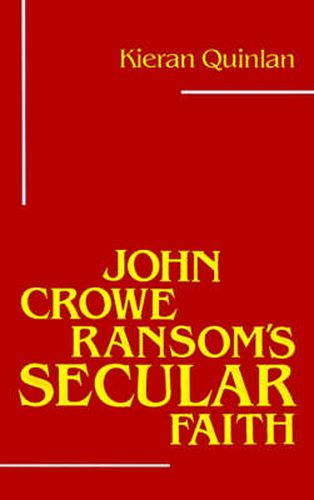Readings Newsletter
Become a Readings Member to make your shopping experience even easier.
Sign in or sign up for free!
You’re not far away from qualifying for FREE standard shipping within Australia
You’ve qualified for FREE standard shipping within Australia
The cart is loading…






This title is printed to order. This book may have been self-published. If so, we cannot guarantee the quality of the content. In the main most books will have gone through the editing process however some may not. We therefore suggest that you be aware of this before ordering this book. If in doubt check either the author or publisher’s details as we are unable to accept any returns unless they are faulty. Please contact us if you have any questions.
Recent interest in the life and works of John Crowe Ransom has brought to light the many apparent contradictions and discontinuities in the career of this important man of letters. A noted poet, Ransom chose to devote his energies primarily to the composition of prose. A southern agrarian in the 1930s, he later rejected the movement as nostalgic and unrealistic. But perhaps more central to his development as a man of letters, he came to renounce all traditional religious beliefs, even though he was descended from a line of Methodist ministers.
In John Crowe Ransom’s Secular Faith Keiran Quinlan examines these and other incongruities within the context of the writer’s career and offers a substantially revisionist interpretation of his subject. Quinlan argues that the key to understanding Ransom’s development lies in
his early rejection of the tenets of Christian theology and in his consequent effort at articulating an alternative philosophy to live by.
Ransom’s literary efforts are viewed as a philosophical project aimed at discovering an empirical validity for the world rather than a transcendental one.
Quinlan examines Ransom’s development against the background of the literary and philosophic movements that influenced the writer. He shows how thinkers like Kant, Hegel, Dewey, and the logical positivists, and poets like Arnold, Hardy, Stevens, Eliot, and Graves, all made significant contributions to Ransom’s progress.
Although Ransom has often been allied with T.S. Eliot, who turned to religion and a transcendental knowledge of the world, Quinlan contends that Ransom’s real sympathies were with Wallace Stevens, who south a suitable substitute for religious faith in the celebration of a world he felt was emptied of its transcendental component.
Ransom’s difficulties are in many ways symptomatic of the struggles of our age, the supplanting of God and a supernatural world view by scientific advances, the loss of faith, and thus the need to find an alternative meaning in existence. Quinlan stresses that although the gradual emergence of Ransom’s
secular faith
was a direct result of his lifelong dialogue with the Christian tradition, his final belief was that
‘this is the best of all possible worlds’; inasmuch as it is not possible for imagination to acquaint is with any other world.
Quinlan concludes, therefore, that Ransom belongs squarely in the American pragmatist tradition.
$9.00 standard shipping within Australia
FREE standard shipping within Australia for orders over $100.00
Express & International shipping calculated at checkout
This title is printed to order. This book may have been self-published. If so, we cannot guarantee the quality of the content. In the main most books will have gone through the editing process however some may not. We therefore suggest that you be aware of this before ordering this book. If in doubt check either the author or publisher’s details as we are unable to accept any returns unless they are faulty. Please contact us if you have any questions.
Recent interest in the life and works of John Crowe Ransom has brought to light the many apparent contradictions and discontinuities in the career of this important man of letters. A noted poet, Ransom chose to devote his energies primarily to the composition of prose. A southern agrarian in the 1930s, he later rejected the movement as nostalgic and unrealistic. But perhaps more central to his development as a man of letters, he came to renounce all traditional religious beliefs, even though he was descended from a line of Methodist ministers.
In John Crowe Ransom’s Secular Faith Keiran Quinlan examines these and other incongruities within the context of the writer’s career and offers a substantially revisionist interpretation of his subject. Quinlan argues that the key to understanding Ransom’s development lies in
his early rejection of the tenets of Christian theology and in his consequent effort at articulating an alternative philosophy to live by.
Ransom’s literary efforts are viewed as a philosophical project aimed at discovering an empirical validity for the world rather than a transcendental one.
Quinlan examines Ransom’s development against the background of the literary and philosophic movements that influenced the writer. He shows how thinkers like Kant, Hegel, Dewey, and the logical positivists, and poets like Arnold, Hardy, Stevens, Eliot, and Graves, all made significant contributions to Ransom’s progress.
Although Ransom has often been allied with T.S. Eliot, who turned to religion and a transcendental knowledge of the world, Quinlan contends that Ransom’s real sympathies were with Wallace Stevens, who south a suitable substitute for religious faith in the celebration of a world he felt was emptied of its transcendental component.
Ransom’s difficulties are in many ways symptomatic of the struggles of our age, the supplanting of God and a supernatural world view by scientific advances, the loss of faith, and thus the need to find an alternative meaning in existence. Quinlan stresses that although the gradual emergence of Ransom’s
secular faith
was a direct result of his lifelong dialogue with the Christian tradition, his final belief was that
‘this is the best of all possible worlds’; inasmuch as it is not possible for imagination to acquaint is with any other world.
Quinlan concludes, therefore, that Ransom belongs squarely in the American pragmatist tradition.